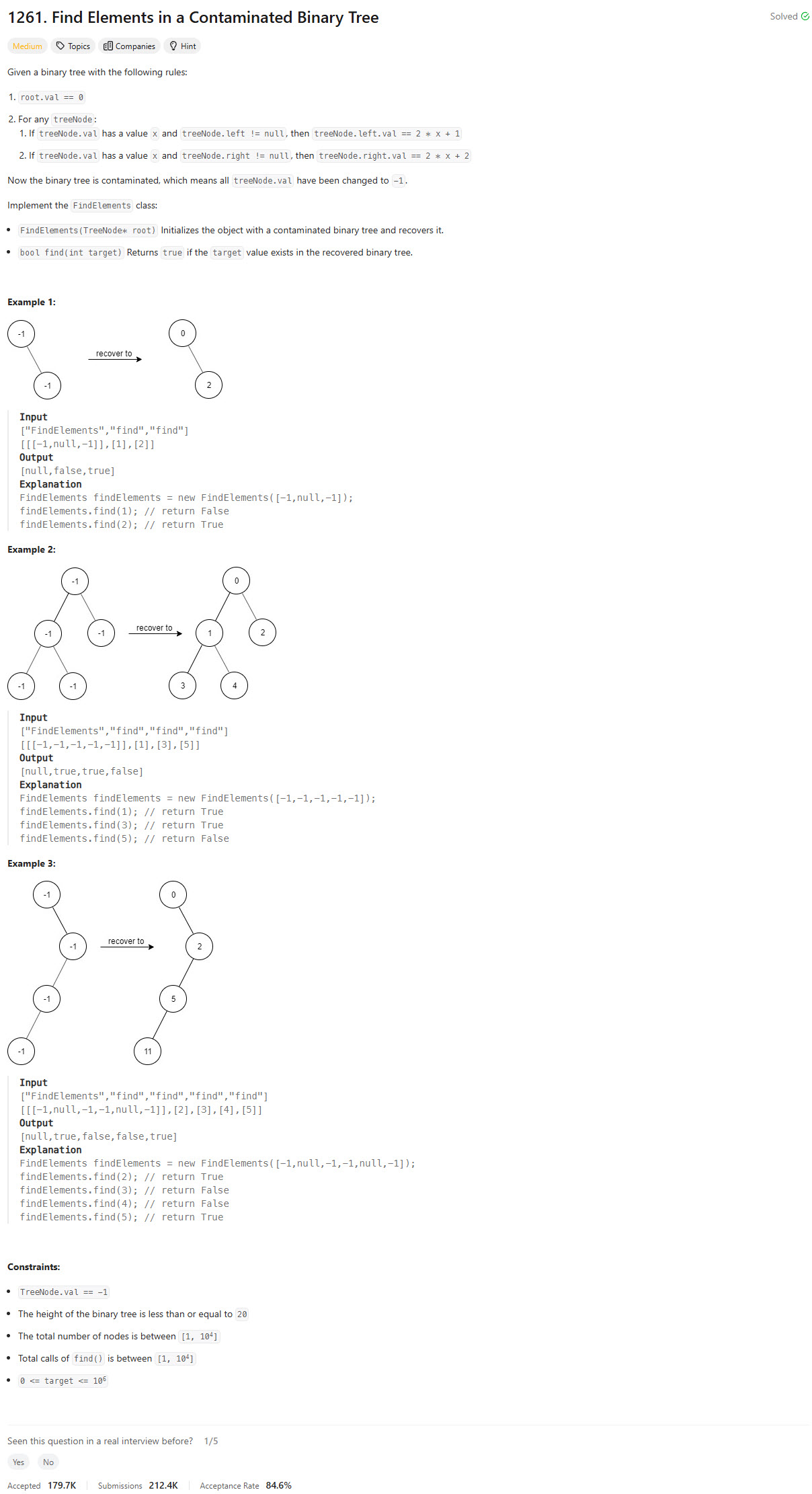Problem of The Day: Find Elements in a Contaminated Binary Tree
Problem Statement

Intuition
When given a corrupted binary tree where every node’s value has been changed to -1, we need to recover it according to the given rules:
- The root node’s value is set to
0. - For any node with value
x, its left child gets the value2 * x + 1, and its right child gets the value2 * x + 2.
To efficiently check if a given value exists in the recovered tree, we can store the recovered values in a set.
Approach
- Recovering the tree: We use a recursive function to traverse the given tree, assigning the correct values according to the rules and storing them in a set for quick lookup.
- Finding an element: Since we stored all valid values in a set, checking for existence of a value is an
O(1)operation.
Steps:
- Start at the root and assign it the value
0. - Traverse the tree recursively:
- Assign
2 * x + 1to the left child. - Assign
2 * x + 2to the right child.
- Assign
- Store all valid values in a set.
- To find a target value, check if it exists in the set.
Complexity
-
Time Complexity:
- Recovering the tree takes \(O(n)\), where
nis the number of nodes, as we visit each node once. - Searching for a target value takes \(O(1)\) using a set lookup.
- Recovering the tree takes \(O(n)\), where
-
Space Complexity:
- The set storing the elements takes \(O(n)\) space.
- The recursion stack takes \(O(h)\) space in the worst case, where
his the height of the tree. - Overall, the worst-case space complexity is \(O(n)\).
Code
# Definition for a binary tree node.
# class TreeNode:
# def __init__(self, val=0, left=None, right=None):
# self.val = val
# self.left = left
# self.right = right
from typing import Optional
class FindElements:
def __init__(self, root: Optional[TreeNode]):
self.elements = set()
self.root = self.recover(root, 0)
def recover(self, root, x):
new_node = TreeNode(x)
self.elements.add(x)
if root.left is not None:
new_node.left = self.recover(root.left, 2 * x + 1)
if root.right is not None:
new_node.right = self.recover(root.right, 2 * x + 2)
return new_node
def find(self, target: int) -> bool:
return target in self.elements
# Your FindElements object will be instantiated and called as such:
# obj = FindElements(root)
# param_1 = obj.find(target)
Editorial
Approach 1: Tree Traversal (DFS)
class FindElements:
def __init__(self, root: TreeNode):
self.seen = set()
self.dfs(root, 0)
def find(self, target: int) -> bool:
return target in self.seen
def dfs(self, current_node, current_value):
if current_node is None:
return
# visit current node by adding its value to seen
self.seen.add(current_value)
self.dfs(current_node.left, current_value * 2 + 1)
self.dfs(current_node.right, current_value * 2 + 2)
Approach 2: Tree Traversal (BFS)
class FindElements:
def __init__(self, root: TreeNode):
self.seen = set()
self.bfs(root)
def find(self, target: int) -> bool:
return target in self.seen
def bfs(self, root: TreeNode) -> None:
queue = [root]
root.val = 0
while queue:
current_node = queue.pop(0)
# visit current_node by adding its recovered value to the set
self.seen.add(current_node.val)
if current_node.left:
current_node.left.val = current_node.val * 2 + 1
queue.append(current_node.left)
if current_node.right:
current_node.right.val = current_node.val * 2 + 2
queue.append(current_node.right)